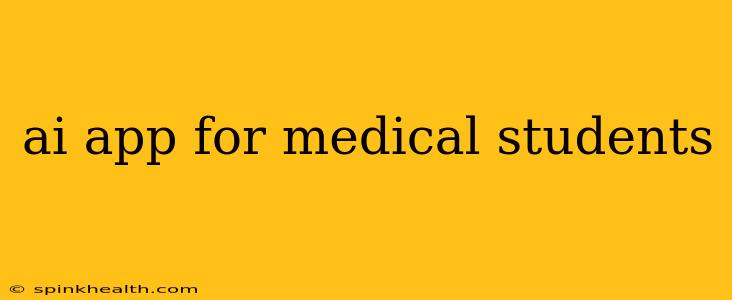AI: The Medical Student's New Best Friend? A Deep Dive into AI Apps for Medical Education
The world of medicine is rapidly evolving, and medical students are at the forefront of this change. No longer are textbooks and lectures the sole tools of the trade. Artificial intelligence (AI) is revolutionizing medical education, offering innovative apps designed to enhance learning, improve diagnostic skills, and even streamline the administrative burden of medical school. But with so many apps flooding the market, how do you separate the wheat from the chaff? Let's explore the landscape of AI apps specifically designed to aid medical students.
What AI Apps Can Medical Students Use?
This isn't a simple question with a simple answer. The field of AI in medical education is burgeoning, with new apps and functionalities appearing constantly. Instead of listing every single app, let's categorize the types of AI tools that are proving most beneficial:
1. Diagnostic Assistance & Image Analysis: Imagine having a pocket-sized expert radiologist or pathologist readily available. Some AI apps are designed to analyze medical images (X-rays, CT scans, MRIs, etc.) and offer preliminary diagnoses or highlight areas of concern. These apps don't replace human expertise, but they can offer valuable second opinions, prompting students to consider different diagnostic possibilities and refine their own analytical skills.
2. Personalized Learning Platforms: One size doesn't fit all when it comes to learning. AI-powered learning platforms adapt to individual student needs, tracking progress and adjusting the curriculum accordingly. These apps can identify areas where a student struggles and provide targeted resources, ensuring that no concept is left behind. This personalized approach can significantly boost learning efficiency and comprehension.
3. Virtual Patients & Simulation: Practicing clinical skills is crucial for medical students, but real-world practice opportunities are limited. AI-powered virtual patients offer realistic simulations of various medical scenarios. These interactions allow students to hone their diagnostic, treatment planning, and communication skills in a safe and controlled environment, without the pressure of real-life consequences.
4. Research & Literature Review Tools: The sheer volume of medical literature can be overwhelming. AI-powered research tools can help sift through mountains of data, identifying relevant articles and summarizing key findings. This saves students valuable time and allows them to focus on understanding the information, rather than simply finding it.
5. Note-Taking and Organization: Medical school is demanding, and keeping organized is key. AI-powered note-taking apps can transcribe lectures, highlight important concepts, and even generate summaries, freeing up valuable study time.
What are the limitations of AI in medical education?
While AI offers incredible potential, it's crucial to acknowledge its limitations. AI apps are tools, not replacements for human interaction and mentorship. Over-reliance on AI could hinder the development of critical thinking, clinical judgment, and the essential human element of patient care. Furthermore, the data used to train AI models must be carefully curated to avoid bias and ensure accuracy. The ethical implications of using AI in medical diagnosis and treatment also warrant careful consideration.
How can I find the right AI app for my needs?
The best AI app for you will depend on your specific learning style, academic goals, and the stage of your medical education. Start by researching apps that focus on your areas of interest or weakness. Read reviews, compare features, and consider any free trials or demos available before making a commitment. Remember to prioritize apps that are rigorously tested and validated for accuracy and reliability.
Are AI apps replacing traditional learning methods?
No. AI apps are designed to supplement, not replace, traditional learning methods. They are powerful tools that can enhance the learning experience, but they cannot replace the importance of lectures, clinical rotations, and the invaluable guidance of experienced physicians and educators. The best approach involves integrating AI tools into a well-rounded medical education.
What are some examples of AI apps for medical students?
This is constantly evolving. Rather than listing specific apps (which may become obsolete quickly), focusing on the types of apps (as detailed above) will give you the best search terms to find currently relevant and helpful resources.
The future of medical education is undeniably intertwined with AI. By embracing these innovative technologies responsibly and critically, medical students can equip themselves with the knowledge and skills necessary to excel in the ever-changing landscape of healthcare. The key is to use AI as a powerful tool to enhance, not replace, the core principles of medical education and practice.

